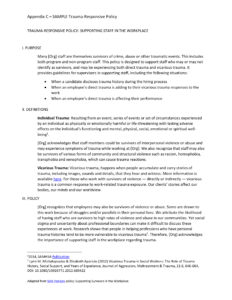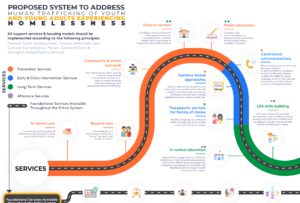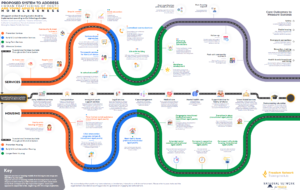The Resource Library includes fact sheets, promising practices, tools, templates, and training materials developed by subject-matter experts with direct experience working with survivors. Resource topics address current trends and challenges in the field.
Search Results 34 matching results for "Trauma Informed"
Sample Trauma-Responsive Policy- Appendix C
This is a Sample HR Trauma-Responsive Policy produced by Kristy Cho.
Levels: Intermediate
Material Types: Tools
Keywords: Policy Program Management Promising Practices Standards of Care Survivor Leadership Trauma Informed
Demographics: Adults
Youth Systems Infographic – Printable 2 Page Version
This 2 page, printable infographic provides a visual representation of the pathways of services and housing options that youth survivors of human trafficking may have access to. This resource is intended for service and housing providers who work with youth and youth survivors of trafficking.
Levels: Intermediate Introductory
Material Types: Tools
Types of Trafficking: Labor Trafficking Sex Trafficking
Keywords: Awareness Case Management Housing Legal Services Program Management Promising Practices Referral Safety Planning Standards of Care Trauma Informed
Demographics: Youth
Youth Systems Infographic
This infographic provides a visual representation of the pathways of services and housing options that youth survivors of human trafficking may have access to. This resource is intended for service and housing providers who work with youth and youth survivors of trafficking.
Levels: Intermediate Introductory
Material Types: Tools
Types of Trafficking: Labor Trafficking Sex Trafficking
Keywords: Housing Legal Services Program Management Referral Safety Planning Standards of Care Trauma Informed
Demographics: Youth
Addressing the Intersection of Substance Use and Housing
The webinar provided attendees with an understanding of how substance use intersects with human trafficking and shared practical examples of best practices to house survivors who may be actively using.
Levels: Introductory
Material Types: Webinars & Videos
Types of Trafficking: Labor Trafficking Sex Trafficking
Keywords: Housing Safety Planning Trauma Informed
Demographics: Adults
Core Competencies for Human Trafficking Response in Healthcare and Behavioral Health Systems
The U.S. Department of Health & Human Services (DHHS) Office on Trafficking in Persons (OTIP) has released a new report on core competencies, or skill sets that healthcare and behavioral health practitioners should have in order to more effectively identify and serve individuals who have either experienced trafficking or are at risk of trafficking. The goal of these competencies is to improve the response to human trafficking through a more trauma-informed and culturally responsive lens.
Levels: Introductory
Material Types: Reports
Types of Trafficking: Labor Trafficking Sex Trafficking
Keywords: Public Health Trauma Informed
Housing Survivors of Human Trafficking During COVID-19
Although housing has always been an essential need for survivors of trafficking,
communities throughout the United States are experiencing new challenges with the spread of COVID-19. This fact sheet discusses the challenges and potential solutions for housing survivors of trafficking during the pandemic.
Levels: Introductory
Material Types: Fact Sheets
Types of Trafficking: Labor Trafficking Sex Trafficking
Keywords: Case Management Housing Trauma Informed
Peer Support Call: Housing Undocumented Survivors of Trafficking During COVID-19
As we navigate the stress and impact of the COVID-19 pandemic, we understand that anti-trafficking programs may have questions or need support navigating shelter and housing systems. The FNTI Housing Project hosted a peer support call and discussed current challenges and strategies for meeting the housing needs of undocumented survivors during this difficult time.
Levels: Introductory
Material Types: Webinars & Videos
Types of Trafficking: Labor Trafficking Sex Trafficking
Keywords: Case Management Foreign Nationals Housing Trauma Informed
Demographics: Foreign National
Housing First for Youth Survivors of Trafficking
Youth survivors often have limited options and access to housing services or are placed in housing situations that may not be trauma-informed. Survivors of human trafficking between the ages of 13-24 have additional and specialized needs that housing programs need to account for. This webinar introduces the concept of Housing First for youth survivors. It addresses common practices found in youth programs that are harmful to survivors and how trauma-informed, survivor-centered practices can be implemented.
Levels: Introductory
Material Types: Webinars & Videos
Types of Trafficking: Labor Trafficking Sex Trafficking
Keywords: Housing Promising Practices Trauma Informed
Demographics: Youth
Housing Solutions for Male Survivors of Trafficking
Identifying and accessing housing options for male survivors can be difficult. Shelters and housing programs often cater to female survivors of trafficking, excluding boys and men. This webinar addresses practical ways service providers can be more responsive to the needs of male survivors and explore housing options that have been useful after exiting a trafficking situation.
Levels: Introductory
Material Types: Webinars & Videos
Types of Trafficking: Labor Trafficking Sex Trafficking
Keywords: Housing Promising Practices Referral Trauma Informed
Demographics: Men and Boys
Follow-Up Technical Assistance Session: Trauma-Informed Practices in Shelters
This technical assistance session is a follow-up to the webinar on Trauma-Informed Practices in Shelters. Expert panelists dive into case scenarios and answer questions on promising practices for shelters that are centered on self-determination, survivor choice, and trauma-informed services.









